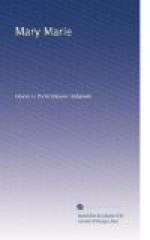I tried to tell her what I’d seen, and what I’d heard that wicked, deep-dyed villain say; but she wouldn’t let me. She shook her head, and said, “Hush, hush, dear”; and that no good could come of talking of it, and she wanted me to forget it. She was very sweet and very gentle, and she smiled; but there were stern corners to her mouth, even when the smile was there. And I guess she told him what was what. Anyhow, I know they had quite a talk before she came up to me, for I was watching at the window for him to go; and when he did go he looked very red and cross, and he stalked away with a never-will-I-darken-this-door-again kind of a step, just as far as I could see him.
I don’t know, of course, what will happen next, nor whether he’ll ever come back for Theresa; but I shouldn’t think even she would want him, after this, if she found out.
And now where’s my love story coming in, I should like to know?
* * * * *
Two days after Christmas.
Another wonderful thing has happened. I’ve
had a letter from
Father—from Father—a
letter—ME!
It came this morning. Mother brought it in to me. She looked queer—a little. There were two red spots in her cheeks, and her eyes were very bright.
“I think you have a letter here from—your father,” she said, handing it out.
She hesitated before the “your father” just as she always does. And ’tisn’t hardly ever that she mentions his name, anyway. But when she does, she always stops a funny little minute before it, just as she did to-day.
And perhaps I’d better say right here, before I forget it, that Mother has been different, some way, ever since that time when the violinist proposed. I don’t think she cares really—about the violinist, I mean—but she’s just sort of upset over it. I heard her talking to Aunt Hattie one day about it, and she said:
“To think such a thing could happen—to me! And when for a minute I was really hesitating and thinking that maybe I would take him. Oh, Hattie!”
And Aunt Hattie put her lips together with her most I-told-you-so air, and said:
“It was, indeed, a narrow escape, Madge; and it ought to show you the worth of a real man. There’s Mr. Easterbrook, now—”
But Mother wouldn’t even listen then. She pooh-poohed and tossed her head, and said, “Mr. Easterbrook, indeed!” and put her hands to her ears, laughing, but in earnest just the same, and ran out of the room.
And she doesn’t go so much with Mr. Easterbrook as she did. Oh, she goes with him some, but not enough to make it a bit interesting—for this novel, I mean—nor with any of the others, either. In fact, I’m afraid there isn’t much chance now of Mother’s having a love story to make this book right. Only the other day I heard her tell Grandfather and Aunt Hattie that all




